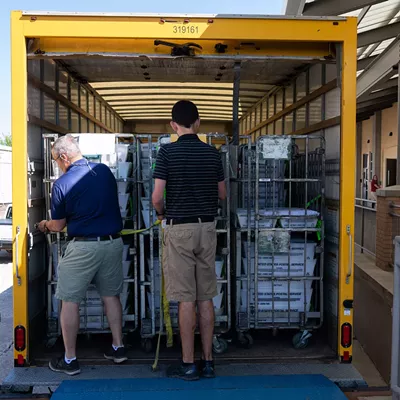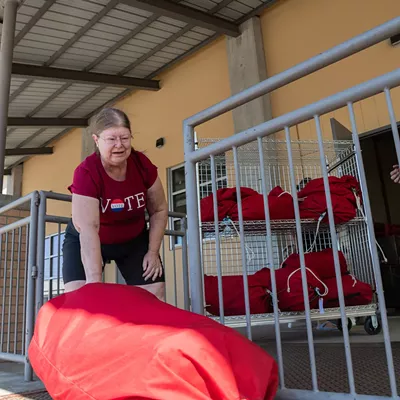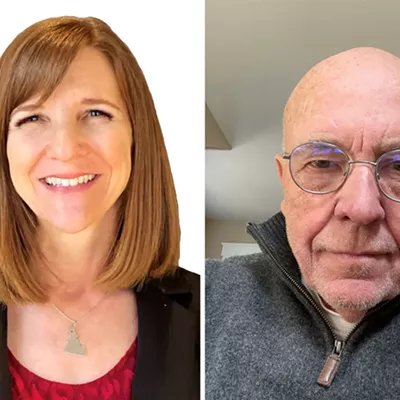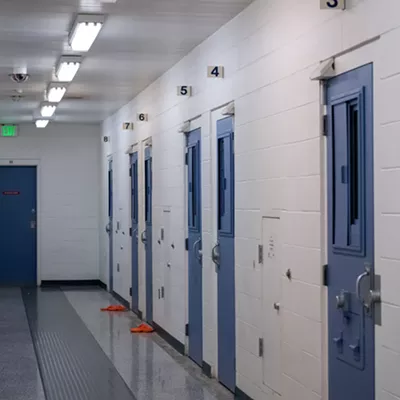
In the weeks leading up to Election Day, local officials are required by law to perform what's known as a "logic and accuracy" test on the ballot counting machines. The test is open to the public, though Washington Secretary of State Steve Hobbs warns that it can be "very boring."
Tim Kinley doesn't think it's boring. Watching last week's test at the Spokane County Elections Office, he and three fellow Republicans give it their undivided attention.
And they ask questions — lots of them.
An official from Hobbs' office patiently does her best to answer the election security questions the visitors pepper her with. Kinley films the whole thing on his phone and plans to post it later on Rumble, an online video platform popular with conservatives and members of the far right. He's an election observer and a member of the Spokane County Republican Party's election integrity committee, which lobbied unsuccessfully this summer for an audit of the 2020 Spokane election.
As he leaves the elections office, Kinley, speaking for himself and not on behalf of the party, explains that he isn't necessarily accusing the county election office of impropriety. He just has questions.
"I'm just trying to process it," Kinley says. "I'm not saying it's happening here, I just don't know."
For two years, Donald Trump has loudly lied about the 2020 election he lost by 7 million votes. The level of distrust and questioning surrounding the local elections process has only increased, says Spokane County Auditor Vicky Dalton, who oversees local elections.
That distrust is especially visible in the public records requests that have overwhelmed Dalton's office in recent months.
There have been 55 requests so far this year, compared with just 11 last year. There were only five requests in 2019 and 2020 respectively, and those were all filed by the same person.
The uptick in requests mirrors a trend reported by election officials in other parts of the country. In many cases, the requests are rooted in election conspiracies and copy-and-pasted from other sources. Many requesters don't appear to know what they're looking for, Dalton says.
One requestor describes themself as an "aggrieved citizen," and says they are preparing a lawsuit and calling for the prosecution of election officials for a variety of unsubstantiated election law violations.
Another wants to physically inspect "ALL ORIGINAL documents and records relating to the 2020 election."
Dalton says there's nothing inherently wrong with records requests and stresses the importance of transparency. But she notes that vague, all-encompassing requests can bog down the system. Officials have an obligation to work with requesters to refine their search and help provide what they're looking for, but many requesters are asking for literally every record relating to the 2020 election. That's thousands of pages, many of which have to be redacted for privacy or security reasons.
"It's basically paper terrorism," Dalton says. "It's burning a lot of resources."
Tony Dinaro, the county's public records officer, estimates that officials have spent well over 100 staff hours dealing with the flood of requests this year.
"It's been extremely difficult," Dinaro says.
"LEGITIMATE VOTES"
In July, polling conducted by SurveyUSA found that one in five Washington state Republicans have no trust in voting by mail or local elections officials. The survey also found that one in three of these Republicans falsely believe Trump won the 2020 election.
Dalton says she's had some success when talking with community members who are genuinely curious and want to learn more about the election process. But for people who truly believe the big lie? Dalton says she hasn't been able to find the information that will change their minds.
"It's at times really aggravating," Dalton says, noting that people who "believe that the system is fraudulent just ignore the integrity and the professionalism of the people who work in elections."
Dalton, a Democrat who has been the elected county auditor for 24 years, is up for reelection against Bob McCaslin, a retiring state representative who received 48 percent of the primary vote compared with Dalton's 52 percent. McCaslin, a Republican, co-sponsored a bill in 2021 calling for a manual recount of the 2020 election to ensure that "only legitimate votes were counted."
When asked if he thinks there was widespread voter fraud in the 2020 election, McCaslin says he doesn't have any personal proof. He does say there's been some information that he thinks "brings a question."
The information he's referring to comes from a report from the Spokane GOP and Washington Voter Research Project that was based on doorbelling organized by conservative activist Glen Morgan. The report claims to have found significant "anomalies." Dalton says that, despite repeated requests, the group has not given the auditor's office a list of names and addresses that would allow them to verify the findings.
McCaslin says he met with Morgan and the canvassing group at their request in summer 2021, before he announced his run for county auditor.
"I thought some of the things that they found were compelling," McCaslin says.
McCaslin says he wants publicly viewable security cameras in the auditor's office. Dalton says cameras have already been installed through a grant from the state, but they're not yet turned on because her office is still figuring out how to protect private voter information that would be visible on screen.
2000 MULES
Last month during Sunday service at his church, On Fire Ministries, former state Rep. Matt Shea — who McCaslin describes as a friend and very effective legislator — asked his congregation to raise their hands if they'd seen the film 2000 Mules. A recording made of the service doesn't show the audience, but Shea's reaction indicates that a good number raised their hands.
The thoroughly debunked film by conservative commentator Dinesh D'Souza makes false claims of significant voter fraud during the 2020 election. It's become something of a cultural phenomenon for ultra-conservatives.
"More than anything, 2000 Mules has fueled election denial mania across the far right," says Devin Burghart, executive director of the Seattle-based Institute for Research and Education on Human Rights, which monitors far-right extremism.
When it came out in May 2022, the film gave new life to an election-denial movement that was struggling for direction post-Jan. 6, Burghart says. Trump has repeatedly praised the film, calling it the "greatest and most impactful documentary of our time."
During the Spokesman-Review's "Pints and Politics" forum, far-right Republican Rep. Rob Chase, who took over Shea's seat in 2020, said his constituents don't trust votes anymore after watching the film.
McCaslin says he's heard similar things from constituents. He's seen the movie himself, but says it would be unfair to apply everything in the movie to Spokane County, though he thinks it "does bring up some issues at least."
After asking his congregation if they'd seen the film, Shea invited them to attend a ballot drop box observer training session that was scheduled to be held at his church later that month.
"We believe that we need to be going into every area of our culture," Shea said during Sunday service a week later. "One of those areas is elections. And one of those areas is watching drop boxes to make sure that, I don't know, they don't get stuffed with anything that's not of God, OK? Hallelujah."
EYES FOR US
On the evening of Sept. 30, I headed over to Shea's church. I'd heard he was training his congregation how to observe ballot boxes, so I figured it was worth a shot to check it out. I wasn't exactly thrilled. Shea, after all, had once described journalists as "dirty, godless, hateful people."
But when I arrived, the door was locked. Two women stood outside, also locked out. They said they were there for the drop box training, and that someone named Ruth had sent them.
I said I'd check the other doors, and walked around the building to see if any might be open. When I got back, the women were gone, and the door was still locked.
I tracked Ruth down a few days later. A message from the Spokane GOP was circulating online and telling patriots to contact her about ballot box training. Her name is Ruth Ryan, and she's a retired teacher and current chairperson of the Spokane County Republican Party's election committee. She's scrutinized election security long before it was cool.
All those records requests filed with the election office in 2019 and 2020 that came from the same person? That was Ryan.
Ryan became a poll site inspector in the 1980s and has spent several elections as a precinct committee officer with the Republican Party. She also works to coordinate the party's certified election observers. Ryan says her interest in elections stems from her mother, who was also a poll site inspector and raised Ryan to be civic-minded. Ryan also cites an incident in the 1960s when she went to vote and says she was given the wrong ballot.
She doesn't think the election was stolen, but she says there were "some things that went on in the 2020 election that should not have happened."
Ryan says the whole thing with Shea was misinterpreted by the public. In her telling, Shea's church reached out to her because some people in the congregation were interested in learning more about the laws that apply to citizen election observers.
Ryan was going to invite them to come by the Spokane GOP's conference room where she usually holds meetings for official drop box observers, but the construction on Monroe Street made getting there a mess. She also worried the room wouldn't be big enough for everyone. So she decided to just hold the meeting at Shea's church.
But then word got out that Shea's church was going to be training ballot drop box observers. And with Shea's well-documented history of extremism — his distribution of a pamphlet titled "Biblical Basis for War" and his speeches telling Christians to prepare for "total war," among other things — a lot of folks got worried.
That worry is not misplaced, but it's important to first note the difference between citizen and certified ballot drop box observers.
"Certified" observers are selected by political parties and then certified after training sessions with the county elections office. The main job of election observers is to basically watch different aspects of the elections process, including ballot drop boxes. If something looks off, the observer can let an election official know, says Spokane County Elections Manager Mike McLaughlin, who oversees observer training for the elections office.
"They're observing for the parties," McLaughlin says. "But they're also eyes for us."
Then there are "citizen" election observers, who are people without appointments from political parties or certification from the county. It's a free country, so there's nothing stopping anybody from going out to a ballot drop box and watching it for a few hours.
Washington does have laws designed to prevent electioneering and voter intimidation within 25 feet of ballot drop boxes. There are a number of prohibited behaviors that essentially boil down to: Don't be weird and make people uncomfortable while they're trying to vote.
Election conspiracies have prompted self-appointed volunteer groups to monitor drop boxes across the county. Burghart, with the Institute for Research and Education on Human Rights, says these drop box "vigilantes" are deeply troubling, and he worries they will cause voter suppression, particularly among voters of color.
"Many groups on the far right have adopted this kind of election denial/ballot box vigilante approach heading into 2022 based on the conspiracies of 2000 Mules," Burghart says. "To see someone like Matt Shea and his group adopt it is a sign that this is happening in a lot of different places."
Ryan, the old-school Republican election observer, says she was worried about all the public attention cast on the meeting leading to things getting "off the wall crazy." So at the last minute, the meeting was moved to the GOP office on Monroe Street. Ryan insists that people's concerns were misplaced. Shea wasn't even at the meeting, she says.
Ryan says four or five cars of people from Shea's church showed up. Most were interested in being citizen observers, but Ryan says a few expressed interest in becoming certified observers.
She's also coordinating other official Republican observers who aren't connected to Shea's church. She says more than 50 have signed up so far. And she asks every volunteer if they've seen 2000 Mules. A good majority have, she says, including herself. ♦






























